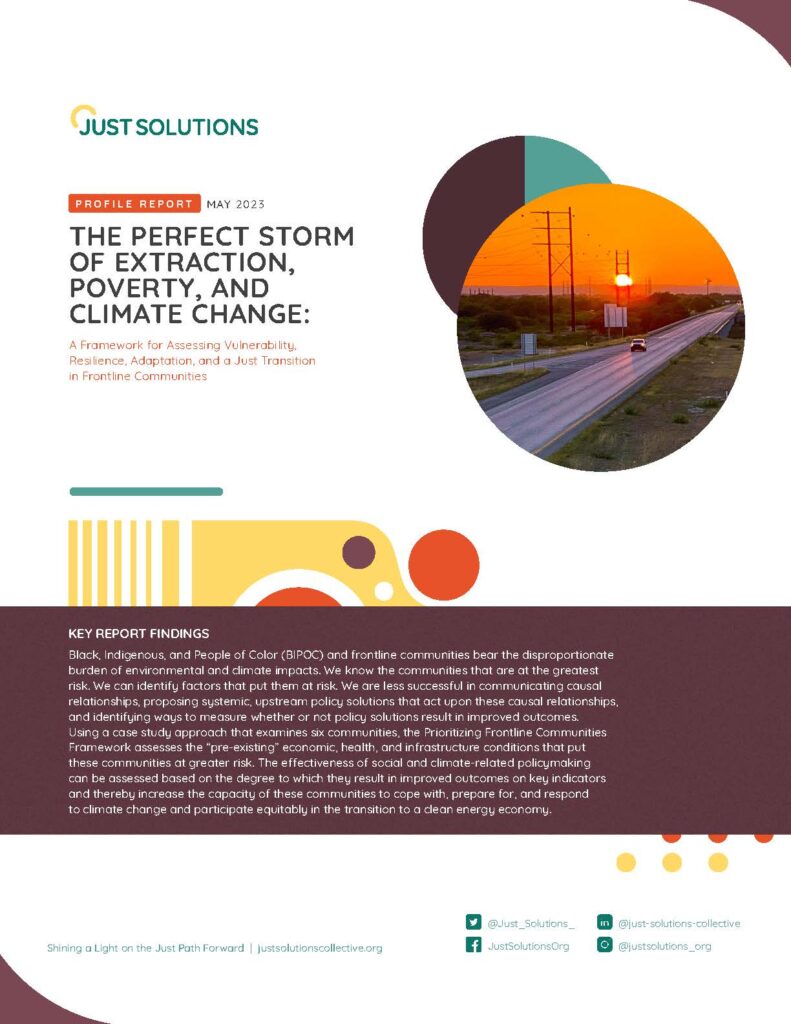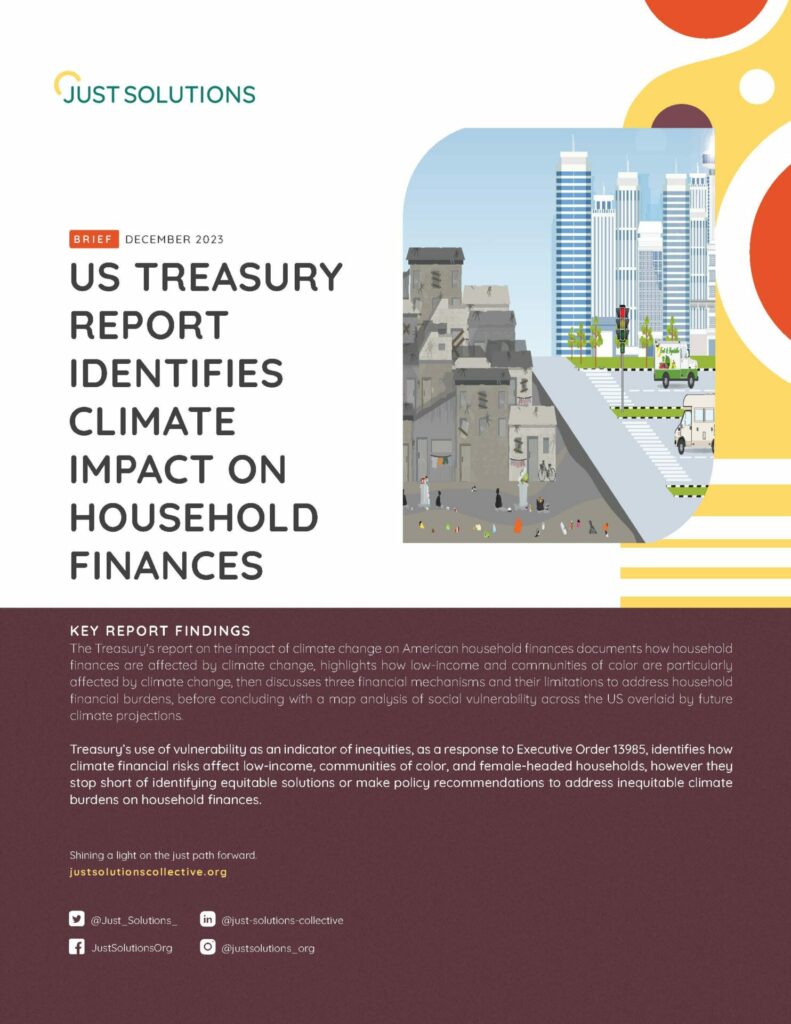March 2024 marks Just Solution’s 3rd Anniversary! In celebration, we reflect on our research and policy analysis work and leadership as we continue driving equity-centered solutions to the climate crisis.
Over the last year, the Just Solutions team has experienced tremendous growth. We have expanded our team and leadership and refined and scaled innovative and just climate research and policy solutions in the climate and environmental justice movement. Our team of Senior Research & Policy Analysts and Senior Fellows, work to drive innovation and scale proven, equitable policies and programs that are informed by and bring lasting benefits to frontline communities most impacted by the climate crisis.
This article overviews and highlights some of our climate justice research and policy analysis from our third year aimed at meeting the needs of our partners and proactively filling movement-wide content and strategy gaps in support of justice-centered solutions. To learn more about our work from the last two years, visit our previous blog here and to learn more about our overall work, please visit our website and our articles here.
Framework for Assessing Vulnerability, Resilience, Adaption, and a Just Transition
Frontline communities are experiencing greater effects of climate change in terms of impact and frequency. Given the exposure of these communities to risks of all kinds, these impacts will likely increase in the future without effective policy solutions and implementation of these solutions.

For these reasons, Just Solutions published the “Perfect Storm of Extraction, Poverty, and Climate Change” report that takes a case study approach to examine six frontline communities across the country. The Prioritizing Frontline Communities Framework assesses the “pre-existing” economic, health, and infrastructure conditions that put these communities at greater risk. This paper argues that the “pre-existing conditions” experienced by these communities are the direct consequence of enacted policies that have deprived these communities of resources and assets, environmentally degraded or undervalued their lands, or facilitated systemic racism. We believe that the effectiveness of social and climate-related policymaking can be assessed based on the degree to which they result in improved outcomes on key indicators and thereby increase the capacity of these communities to cope with, prepare for, and respond to climate change and participate equitably in the transition to a clean energy economy. The incorporation of community perspectives on these topics throughout the paper grounds and validates the data collected. Read the full report here.
Disaster Resilience & Climate Solutions
In response to the various climate hazards and disasters affecting communities, the Biden Administration has responded with changes in federal policies. Just Solutions works to identify the policies that most impact frontline communities to monitor the implementation and help ensure communities have equitable access to disaster recovery and resilience.
Community Disaster Resilience Zones Act
On December 20, 2022, President Biden signed into law the Community Disaster Resilience Zones Act which will identify top communities at risk of natural hazards and disasters and provide technical support and financial assistance for mitigation and resilience projects. Our article, the National Risk Index: Funding Disaster Resilience and Mitigation in Frontline Communities identifies potential impact for frontline communities noting that it is important for FEMA to develop and utilize accurate tools when determining which communities are at the highest risk of natural hazards. Our analysis also includes a review and critique of FEMA’s National Risk Index (NRI).
FEMA’s Interim Final Rule
In addition, FEMA’s proposed new Interim Final Rule change is a step towards equity and improving access. On January 22, 2024, FEMA released an Interim Final Rule that proposes significant modifications to their Individual Assistance (IA) Program that provides financial assistance and direct services to eligible individuals and households affected by presidentially declared disasters. This change means disaster survivors will have greater accessibility and more benefits to FEMA assistance. The changes proposed in this interim final rule will take effect on March 22, 2024. FEMA is collecting public comment on this rule for 180 days until July 22, 2024. Just Solutions will monitor the implementation of the new policies and strengthen their application to help ensure equitable access to disaster recovery and resilience for frontline communities.
Federal Investments & the Inflation Reduction Act
After the Inflation Reduction Act (IRA) was enacted in August 2022, our analysis found that many supporters’ claims about how it would advance environmental and climate justice were overstated. However, with intentional implementation that centers the leadership and direct benefits of the most impacted communities, key parts of IRA could live up to its environmental and climate justice objectives.
Home Energy Rebates & the IRA
Aside from the energy tax credits, which account for the vast majority of the IRA’s investments, the IRA’s flagship programs that directly benefit individuals and households are home energy rebates. On March 3rd, 2023 we submitted comments in response to the DOE’s Request for Information (RFI), which sought input to inform the creation of program guidance and related tools for these rebate programs. Supported by 60 equity, environmental justice, community-based, and grassroots organizations, coalitions, and allies, we provided recommendations on how DOE can implement both programs to prioritize equity and environmental justice. Read a summary of Home Energy Rebates and the IRA Recommendations for Equity and EJ, and our full comment letter here.
On July 27, the Department of Energy released long-awaited guidance for the Home Energy Rebate Programs, outlining requirements applicable to the states and territories that will administer these programs. Many of Just Solutions’ recommendations were incorporated into the new guidance as either requirements or recommendations, which are discussed here. We will continue to work with our partners to support equitable implementation of the Home Energy Rebates Programs in this next phase.
Greenhouse Gas Reduction Fund
Besides energy tax credits, the $27 billion Greenhouse Gas Reduction Fund (GGRF) is the single largest climate program in the Inflation Reduction Act. On April 19, EPA released additional information detailing the agency’s plans for this program in the form of its Implementation Framework. While the Implementation Framework provides much needed clarity in several areas, many crucial questions about the program remain unanswered. In collaboration with our partners, we developed the GGRF Best Practices for Equity and Governance to address these concerns and to help ensure that environmental justice communities are meaningfully centered and empowered within the GGRF program. Along with over 50 organizational endorsers, we called on applicants to publicly commit to adhering to the best practices for equity and governance, read full best practices, and see the list of organizational endorsers here.
Low-Income Communities Bonus Credit Program

In addition to tax credits from the IRA, the Low-Income Communities Bonus Credit (LICBC) program has particular potential to benefit environmental justice and low-income communities because it provides extra credit amounts for small wind or solar installations in low-income communities. We collaborated with equity and environmental justice-focused partners to submit comments on the proposed rule. Our recommendations for Treasurey’s LIBC program are summarized here, but you can also read the full comments here.
Hydrogen Production Tax Credit
Among the various uncapped energy tax credits that form the core of the Inflation Reduction Act (IRA), none has been more heavily contested than 45V, the hydrogen production tax credit. This credit, newly created by the IRA, allows hydrogen producers to claim credits for every kilogram of “qualified clean hydrogen” produced. What has received less attention are the various environmental justice impacts and concerns related to hydrogen production, such as safety, air pollution, and water use. Just Solutions submitted comments, along with several frontline organizations and other allies, on the 45V proposed rule to raise these concerns and draw attention to the impacts that increased hydrogen production may cause in environmental justice communities — especially in the current context, where many aspects of the hydrogen economy, particularly safety, remain unregulated. To read our EJ recommendations from the hydrogen production tax credit, visit our analysis here.
Catalytic Program on Utilizing the IRA
The U.S. Department of Health and Human Services (HHS) has launched a new initiative, Catalytic Program on Utilizing the IRA, to mobilize the healthcare sector, particularly safety net providers, to take advantage of opportunities in the Inflation Reduction Act (IRA) to reduce its greenhouse gas emissions, increase energy efficiency, and improve climate preparedness and resilience. The opportunity for safety net providers to increase their capacity to serve their patients – both through greater climate resilience and energy efficiency cost savings can be redirected to patient care – is significant, however, and should not be overlooked. Our article provides opportunities, models, and barriers to the programs.
Tracking Federal Climate Laws & Policies
Last year we tracked changes in key federal climate laws and policies. In collaboration with our partners, Just Solutions provided a vast number of recommendations that center equity and EJ communities.
Fiscal Responsibility Act (FRA)
In May, President Biden signed the Fiscal Responsibility Act (FRA). Our article, “Federal Debt Ceiling, Environmental Justice Communities and NEPA” summarizes how the FRA makes significant changes to one of the country’s bedrock environmental laws disguised as “permitting reforms.” The National Environmental Policy Act (NEPA) allows the public and decision-makers to understand the environmental impacts of major federal actions and provides avenues for public participation in these decisions. NEPA’s analysis of potential alternatives and commitment to mitigation measures help ensure the federal government remains transparent and accountable to environmental justice communities. Our allies are demanding that we expand NEPA’s scope and powers to protect environmental justice communities, as the participation of EJ voices are critical to preserve NEPA’s core purposes of informed decision-making and ensure equal access to a healthy environment.
EPA’s Carbon Pollution Standards
Last summer, we provided equity recommendations for EPA’s Carbon Pollution Standards as a response to the U.S. Environmental Protection Agency’s (EPA) proposed rules that would create the first carbon pollution standards in line with the Agency’s authority under section 111 of the Clean Air Act. While the Proposed Rule is meant to limit man-made carbon emissions and help mitigate the climate crisis, it is uncertain whether the plan can result in overall emission cuts. Just Solutions submitted comments to EPA on this rule, raising environmental justice concerns and making recommendations for improvement.
National Environmental Policy Act (NEPA)
In addition, the federal Council for Environmental Quality (CEQ) proposed changes to the National Environmental Policy Act (NEPA) that could get us closer to analyzing climate change impacts, addressing the concerns of environmental justice communities, and uplifting the role of Tribal governments. Most notable are revisions that reinstate many of NEPA’s principles and functions that were improperly deleted or changed during the last administration. Just Solutions submitted comments for further improvement on these proposed revisions to NEPA regulations. A description of the recommendations and EJ revisions included can be found here.
US Treasury Department Climate Change and Household Finances

Under President Biden’s Executive Orders, the US Treasury Department was required to “analyze and understand the impact of climate change on the financial wellbeing of vulnerable populations.” Their report titled, “The Impact of Climate Change on American Household Finances” identified eight ways climate disasters impact household finances. While they identified climate-induced burdens on households with lower incomes, they stopped short of identifying how financial systems contribute to these inequities and recommending solutions. Our brief discusses important missing links between financial institutions themselves and the inequities in climate change impacts on people of color and low-income households.
At the Intersections of Climate Justice
Intersectionality is fundamental in social justice movements, as Audrey Lorde said, “There is no such thing as a single-issue struggle because we do not live single-issue lives.” Our article, “Women and gender justice in the clean energy future”, notes how the clean energy sector is one of the fastest growing sectors of our economy, yet currently employs fewer Black and women workers. The article summarizes policy mechanisms to promote and achieve gender justice in the clean energy sector.
Our article, “LGBTQ History Month: Intersectionality with Climate Justice” exemplifies the unique ways the LGBTQ community has been impacted by climate change and how being aware of this information can inform and shape our efforts today. Just Solutions ensures that the solutions we support are inclusive of the needs of all historically disadvantaged communities.
Building Collective Power, Our Digital Impact
Beyond our reports and analyses, our movement needs effective communicators who can convey environmental justice priorities in impactful ways that move people to shift their understanding of environmental and climate solutions toward a racial, economic, and environmental justice framework. In addition to our reports and articles, we have expanded our educational communications to include multiple platforms such as webinars, social media platforms, and our very own podcast.
We elevated community-created solutions with webinars that engaged over 200 advocates, practitioners, and allies, a majority from Frontline-EJ organizations. Our social media platforms garnered over 1,400 social media impressions. We fostered learning with EJ advocates through curated spaces like “Tea Time with Just Solutions.” We launched a new video series, “Just Solutions: Collective Stories” to uplift equitable solutions through storytelling focused on the impactful and motivating experiences of EJ leaders and advocates.

We also launched the Just Solutions Podcast which explores relevant climate and environmental justice stories from the perspective ofc frontline EJ communities. We interview experts working in EJ to break down program models, policy, and research while always considering the impact on Frontline communities. Hosted by our Executive Director, Aiko Schaefer, topics include but are not limited to understanding nuclear energy, community choice utilities, exploring the intersections of labor and climate policy, and grid resilience and reliability. Guests range from environmental justice policy leaders to public agencies, and our very own staff. Find us on Spotify, Apple Podcast, iHeart Radio, and Audible.
Moving Forward

With only three months into the year, Just Solutions has already launched two key collaborative efforts. The first is the Hydrogen EJ Framework, which provides a framework for communities to evaluate hydrogen energy concepts and critically analyzes the implications to inform community decision-making. In developing this informed analysis, Just Solutions convened a Research Collaborative of nine community-based climate and EJ organizations, ensuring that the perspectives of various communities, sectors, and geographies were represented. Read the framework here.
Our second effort is the Leading with Race in Climate Solutions. Race conscious policies are critical for climate solutions. In order to defend and extend decades of progress on racial justice, we need to come together now to reaffirm our commitment to leading with race in climate change solutions. This includes fully understanding our legal options and being able to distinguish between scare tactics and legal constraints. Read our explainer deck here.
Our ambitious plans for 2024 and beyond reflect our commitment to advancing just solutions at a scale and pace that matches the urgency of the climate crisis. We know that we can only succeed with your support. In this spirit, we invite you to join us by making a tax-deductible donation today. We look forward to more years of moving climate solutions forward together.
